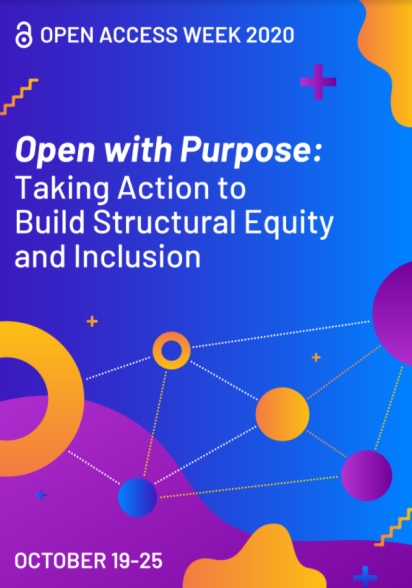Open Access Week takes place October 19-25, 2020. An initiative of the Scholarly Publishing and Academic Resources Coalition (SPARC), Open Access Week is presented as an opportunity for the academic and research community to learn about the potential benefits of Open Access, to share what they’ve learned with colleagues, and to help inspire wider participation in helping to make Open Access a new norm in scholarship and research.”
This year’s theme, “Open with Purpose: Taking Action to Build Structural Equity and Inclusion,” builds on the discussions of the 2018 and 2019 themes in centering the urgent need for action on equity and inclusion in this work. According to the 2020 Open Access Week Advisory Committee, “Openness can be a powerful tool for building more equitable systems of sharing knowledge. Rebuilding research and scholarship to be open by default presents a unique opportunity to construct a foundation that is fundamentally more equitable. Yet today, structural racism, discrimination, and exclusion are present and persistent in places where openness is a core value. As a global community, it is important to understand that the systems and spaces of the present are often built upon legacies of historic injustice and that addressing these inequities is a necessity.”
Check out Seton Hall University Libraries’ guide to Open Educational Resources (OER) here.
Free Webcast on Wednesday, October 21!
The Association of College & Research Libraries (ACRL) is offering a free webcast celebrating Open Access Week. Tune in on Wednesday, October 21, at 2:00 p.m. Eastern, for “Celebrating Open Access Week: Building Structural Equity and Inclusion in Scholarly Communications.” Join recipients of ACRL’s scholarly communications research grants—based on research suggested by 2019’s Open and Equitable Scholarly Communications: Creating a More Inclusive Future—for a discussion of their projects; the challenges of enacting change in scholarly communications including the global digital divide and information inequality, decolonization, democratization, and privilege (or the lack thereof); and practical, actionable steps that academic librarians can take to help build a better future.

